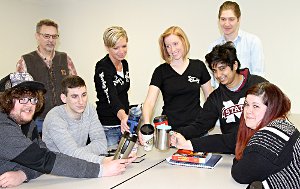March 16, 2016
 Credits in early childhood development were all that stood between Karin Cooney and advancement to the director position at Traverse City’s Angel Care child care. Yet Cooney needed to be at work Monday through Friday.
Credits in early childhood development were all that stood between Karin Cooney and advancement to the director position at Traverse City’s Angel Care child care. Yet Cooney needed to be at work Monday through Friday.
NMC’s child development program solved her conundrum. The classes are nearly all scheduled in hybrid formats, meaning limited face-to-face sessions, most offered evenings or Saturdays, with required online work in between. This semester she’s taking Human Growth and Development, which meets five Saturdays a semester. It’s been ideal.
“The class makes it seem like you’re a part of something, but I have the flexibility to do the coursework when I have the time,” Cooney said. (Above, students in a Saturday morning English class.)
Registration for the fall semester begins today, and students will see more courses are being offered in hybrid formats, also known as blended, which combine the benefits of face-to-face classes with the convenience of online.
Last fall, nearly 17 percent of NMC courses were offered in either online-only or hybrid formats. Such courses also mean fewer commutes, saving students time and money. Kalkaska resident Amber Marsh, 35, is enrolled in a hybrid English course that meets Thursdays, and an in-person class that meets Tuesdays and Thursdays.
“I am reluctant to take a course that mandates three drives into town,” Marsh said. But she added that some in-person is important. “I am leery to take an all-online class, as I have had such great success with the hybrid/face to face interaction.”
 Social Sciences instructor Cheryl Bloomquist said converting what was originally an entirely face-to-face course improved the delivery. Originally the Human Growth and Development course was offered seven Saturdays from 8 a.m. to 4:30 p.m. The intensity left students brain dead by 2:30, she said.
Social Sciences instructor Cheryl Bloomquist said converting what was originally an entirely face-to-face course improved the delivery. Originally the Human Growth and Development course was offered seven Saturdays from 8 a.m. to 4:30 p.m. The intensity left students brain dead by 2:30, she said.
In 2011 she converted the course, which now meets from 9 a.m. to 3 p.m. five Saturdays, with additional content online.
“This hybrid combination is so much better in terms of piecing the information out,” Bloomquist said.
Time management in hybrid courses isn’t always easy for students, Bloomquist acknowledged. Last semester, she experimented with ending her face-to-face sessions in a computer lab so students could begin the online work with her available as a resource.
“That was really quite successful,” she said. “When they leave class, they’ve started their work.”
Cooney has been so impressed with the child development program that she’s contemplating requiring certain courses for her staff of 15, who care for 50 children.
“I’m willing to juggle my employees, so they can get the knowledge,” she said. “It only helps us.”
